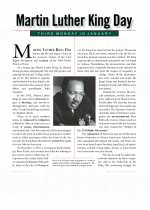Famous Americans
Studying famous Americans is an important part of learning about history and culture in the United States. It helps us understand the contributions and impact of individuals who have played a significant role in shaping the nation. From political leaders and activists to inventors and artists, famous Americans have made a lasting mark on the country's development and identity.
Key Figures to Study
When learning about famous Americans, it's essential to explore a diverse range of individuals who have influenced American history. Some key figures to study include:
- George Washington - the first President of the United States and a founding father
- Abraham Lincoln - the 16th President, known for leading the country during the Civil War and the emancipation of slaves
- Rosa Parks - a civil rights activist known for her pivotal role in the Montgomery Bus Boycott
- Thomas Edison - an inventor who made groundbreaking contributions to the development of electric light, power, and communication
- Harriet Tubman - an abolitionist and activist who played a significant role in the Underground Railroad, helping enslaved individuals escape to freedom
Study Guide
When studying famous Americans, it's important to delve into their backgrounds, contributions, and legacies. Here's a study guide to help you explore the lives of these influential individuals:
Biographical Information
Begin by researching each famous American's background, including their birthplace, childhood, and early life experiences. Understanding their upbringing and personal history can provide valuable insights into their later achievements and impact on society.
Major Accomplishments
Identify the major accomplishments and contributions of each figure. For example, examine the political leadership of George Washington and Abraham Lincoln, the activism of Rosa Parks, the inventions of Thomas Edison, and the humanitarian efforts of Harriet Tubman.
Impact on Society
Consider the lasting impact that each individual has had on American society and culture. This may include changes in laws, advancements in technology, progress in civil rights, or shifts in public awareness and attitudes.
Legacy
[Famous Americans] Related Worksheets and Study Guides:
.◂Social Studies Worksheets and Study Guides Third Grade. Famous Americans
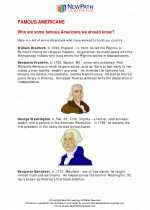
 Worksheet/Answer key
Worksheet/Answer key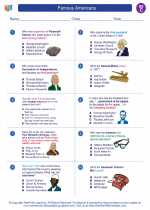
 Worksheet/Answer key
Worksheet/Answer key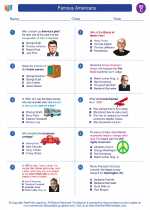
 Worksheet/Answer key
Worksheet/Answer key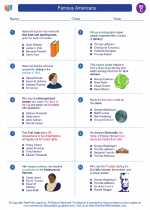
 Worksheet/Answer key
Worksheet/Answer key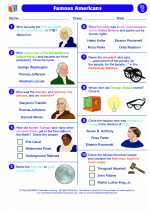
 Worksheet/Answer key
Worksheet/Answer key